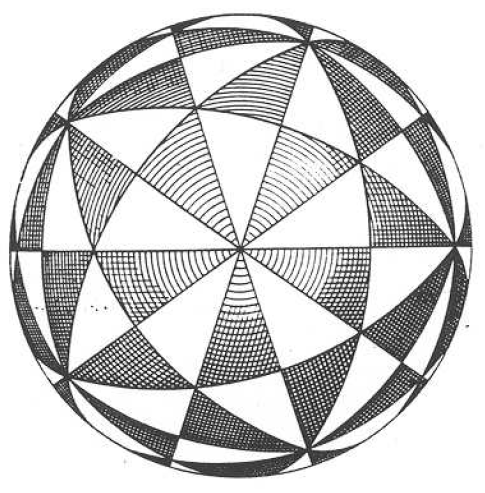Problem - S. Sharma (India)
Show that
\[\int_0^\infty\frac{x\sinh(x)}{3+4\sinh^2(x)}\,\mathrm dx=\frac{\pi^2}{24}.\]Solution
Call the integral in question $I$. Let $x\mapsto \ln(x)$, so that $\mathrm dx\mapsto\frac{\mathrm dx}{x}$ and
\[\begin{align*} I &= \int_1^\infty\frac{\ln(x)\left(\frac{x-\frac{1}{x}}{2}\right)}{3+4\left(\frac{x-\frac{1}{x}}{2}\right)^2}\cdot\frac{\mathrm dx}{x} \\ &= \int_1^\infty \frac{\ln(x)(x^2-1)}{2(x^4+x^2+1)}\,\mathrm dx \\ &= -\frac{1}{2}\int_1^\infty\frac{\ln(x)(1-x^2)^2}{1-x^6}\,\mathrm dx. \\\end{align*}\]Now if we make the change of variables $x\mapsto\frac{1}{x}$, so that $\mathrm dx\mapsto -\frac{\mathrm dx}{x^2}$, we get
\[\begin{align*} I &= -\frac{1}{2}\int_0^1\frac{\ln(x)(1-x^2)^2}{1-x^6}\,\mathrm dx \\ &= -\frac{1}{2}\int_0^1\frac{\ln(x)(1-2x^2+x^4)}{1-x^6}\,\mathrm dx \\ &= -\frac{1}{2}\int_0^1\ln(x)\sum_{n=0}^\infty\left(x^{6n}-2x^{6n+2}+x^{6n+4}\right)\,\mathrm dx \\ &= \frac{1}{2}\sum_{n=0}^\infty\left(\frac{1}{(6n+1)^2}-\frac{2}{(6n+3)^2}+\frac{1}{(6n+5)^2}\right).\end{align*}\]The above interchange of integration and summation is justified, as the series converges uniformly on $[0,\,1]$. And the integrals of the form $\int_0^1\ln(x)x^\alpha\,\mathrm dx$ may be calculated by applying differentiation under the integral sign to $\int_0^1 x^\alpha\,\mathrm dx$.
Evaluating the above infinite series is relatively straightforward, as it reduces to a sum of trigamma functions and a well known series,
\[\begin{align*} I &= \frac{1}{2}\left(\frac{\psi'\left(\frac{1}{6}\right)}{36}+\frac{\psi'\left(\frac{5}{6}\right)}{36}-\frac{2}{9}\sum_{n=0}^\infty\frac{1}{(2n+1)^2}\right).\end{align*}\]By the reflection formula for the trigamma function we have $\psi’(1/6)+\psi’(5/6)=\pi^2\csc^2(\pi/6)$, and it is easily derived from $\sum_{n=1}^\infty\frac{1}{n^2}=\pi^2/6$ that $\sum_{n=0}^\infty\frac{1}{(2n+1)^2}=\pi^2/8$. So it follows that
\[\begin{align*} I &= \frac{1}{2}\left(\frac{\pi^2}{36}\csc^2\left(\frac{\pi}{6}\right)-\frac{2}{9}\cdot\frac{\pi^2}{8}\right) \\ &= \frac{1}{2}\left(\frac{\pi^2}{9}-\frac{\pi^2}{36}\right) \\ &= \frac{\pi^2}{24}.\end{align*}\]